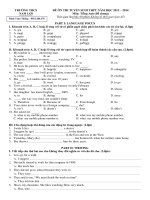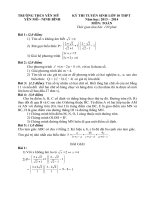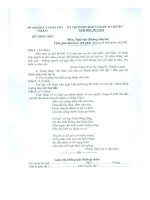- Trang chủ >>
- Đề thi >>
- Đề thi lớp 4
Chuyên Anh vào 10 Bắc Kạn (2013 – 2014)
Bạn đang xem bản rút gọn của tài liệu. Xem và tải ngay bản đầy đủ của tài liệu tại đây (142.06 KB, 6 trang )
<span class='text_page_counter'>(1)</span><div class='page_container' data-page=1>
<b>SỞ GIÁO DỤC VÀ ĐÀO TẠO</b>
<b>BẮC KẠN</b>
<b>ĐỀ THI CHÍNH THỨC</b>
(Đề thi gồm có 04 trang)
<b>KỲ THI TUYỂN SINH VÀO LỚP 10 THPT CHUYÊN</b>
<b>NĂM HỌC 2013 – 2014</b>
<b>MÔN THI: TIẾNG ANH</b>
<b>(Dành cho thí sinh thi vào chuyên Tiếng Anh)</b>
<i>Thời gian làm bài: 120 phút, không kể thời gian giao đề</i>
<i><b>(Thí sinh khơng làm bài vào đề thi, làm bài trên giấy thi)</b></i>
<b>SECTION A: PHONETICS (1,0 point)</b>
<b>1. Choose the word (A, B, C or D) in each group that has the underlined part pronounced</b>
<b>differently from the others. </b>
<b>Câu 1: A. advance</b>
B. campus
C. highland
D. blanket
<b>Câu 2: A. laughed</b>
B. watched
C. washed
D. returned
<b>Câu 3: A. congratulation</b>
B. pollution
C. charity
D. ancient
<b>Câu 4: A. economic</b>
B. provide
C. interactive
D. violent
<b>2. Choose the word (A, B, C or D) in each group that has different stress from the others. </b>
<b>Câu 5: A. remote</b>
B. costly
C. unique
D. abrupt
<b>Câu 6: A. balloon</b>
B. parade
C. effect
D. push-up
<b>Câu 7: A. wonderful</b>
B. commercial
C. persuasive
D. productive
<b>Câu 8: A. improvement</b>
B. convenience
C. dormitory
D. disastrous
<b>SECTION B: GRAMMAR AND VOCABULARY (3, 5 points)</b>
<b>1. Choose the best answer (A, B, C or D) to complete each sentence. </b>
<b>Câu 9: </b>
There are many people ……… lives have been spoilt by that factory.
A. whom
B. who
C. whose
D. when
<b>Câu 10: She remembered ……… the message on the net.</b>
A. posting
B. post
C. to be post
D. being post
<b>Câu 11: He says that she will come ……….</b>
A. the following day.
B. the next day.
C. then.
D. tomorrow.
<b>Câu 12: Nobody will refuse to help her with her homework, ………?</b>
A. won’t they
B. won’t he
C. will they
D. will he
<b>Câu 13: He eats so ……… food that he gains weight quickly.</b>
A. many
B. little
C. much
D. few
<b>Câu 14: The American left Sai Gon ……… New York ……… a beautiful morning.</b>
A. for/on
B. to/on
C. at/in
D. few
Câu 15: - "Thanks a lot for your help." - " ……… . "
A.
You're welcomed
B.
It's my pleasure
C. Thanks
D. Both A and B are correct
<b>Câu 16: I am very interested in Vietnamese and I would ……….</b>
A. like some informations about your school.
B. like some informations at your school.
C. like some information at your school.
D. like some information about your school.
<b>Câu 17: They requested that she ……… them some money she borrowed.</b>
A. pays
B. paid
C. paying
D. pay
<b>Câu 18:</b>
There’s a strange man behind us. I think ……….
A.
we are followed.
B.
we are being followed.
C. we are being following.
D. we are following.
<b>Câu 19: He wants to know ……….</b>
</div>
<span class='text_page_counter'>(2)</span><div class='page_container' data-page=2>
<b>Câu 20: This is the best place ……… I can think of for our holiday.</b>
A. which
B. where
C. what
D. that
<b>Câu 21: He thinks that ……… on the internet is a waste of time.</b>
A. to chat
B. chatting
C. chating
D. being chatting
<b>Câu 22: ……… you run quickly, you are likely to be late. </b>
A. If
B. Since
C. Provided
D. Unless
<b>Câu 23: In order to ……… with his studies he worked through the summer. </b>
A. catch up
B. catch on
C. take in
D. take to
<b>Câu 24: This mausoleum ……… to commemorate President Ho Chi Minh.</b>
A. is built
B. has build
C. was built
D. was build
<b>2. Give the correct form of the verbs in brackets.</b>
<i><b>Example: </b></i>
I ……… (to go) to market with my mother yesterday.
<i><b>Answer:</b></i>
went
<b>Câu 25: When I entered his room I saw him ……… (to sleep) in a chair.</b>
<b>Câu 26: I’d rather ………… (to have) a room of my own, however small, than share with someone.</b>
<b>Câu 27: I would understand him if he ……… (to speak) more slowly.</b>
<b>Câu 28: We have to consider ……… (to spend) so much money on a car.</b>
<b>Câu 29: After ……… (to come) home, she cleaned the floor and cooked dinner.</b>
<b>Câu 30: It is necessary that he ……… (to find) the book.</b>
<b>3. Use the correct form of the word in brackets to fill in the blank in each sentence.</b>
<i><b>Example: </b></i>
My father is a ………. He is working in a factory near my house. (WORK)
<i><b>Answer:</b></i>
worker
<b>Câu 31: </b>
The ……… of this factory are widely consumed in this country. (PRODUCE)
<b>Câu 32: Everyone must take part in ……… deforestation. (PREVENT)</b>
<b>Câu 33:</b>
Film festivals are ……… divided into categories like drama, documentary or
animation. (TYPICAL)
<b>Câu 34: We are waiting for the ……… of this plane. (ARRIVE)</b>
<b>Câu 35:</b>
……… has caused many so-called man-made disasters. (FOREST)
<b>Câu 36: In space, washing your hands or having a bath is ………. (POSSIBLE)</b>
<b>SECTION C: READING (3,0 </b>
<b>points</b>
<b>)</b>
<b>1. Choose the word (A, B, C or D) that best fits the blank in the following passage.</b>
The first human ……… (37) probably lived about 2,5 million years ago. But man did not
begin ……… (38) history until he had invented writing only about 5,000 years ago. The period
before man began to write is called the prehistory, and the term prehistoric man refers ………
(39) people who lived during that period.
Prehistoric man took the first steps in
……… (40) civilization. The earliest people were
all hunters. In time, many hunters learnt to plant crops and raise animals for food, and they
……… (41) farmers. Prehistoric man invented simple tools, and he discovered ……… (42)
to make fire. He painted the first pictures ……… (43) shaped the first pottery. And he built and
governed the first cities.
Because early man kept no ……… (44) records, scientists search for bones, tools, and
other prehistoric remains. They study these objects to ……… (45) what early man looked like.
Most of the tools that have been found and studied are made of stone. As a result, the entire period
during ……… (46) early man lived has been called the Stone Age.
</div>
<span class='text_page_counter'>(3)</span><div class='page_container' data-page=3>
<b>Câu 38: A. record</b>
B. to record
C. recording
D. the record
<b>Câu 39: A. about</b>
B. at
C. to
D. in
<b>Câu 40: A. building</b>
B. doing
C. making
D. constructing
<b>Câu 41: A. been</b>
B. are
C. made
D. became
<b>Câu 42: A. what</b>
B. how
C. which
D. where
<b>Câu 43: A. and</b>
B. but
C. though
D. as well
<b>Câu 44: A. speaking</b>
B. spoken
C. writing
D. written
<b>Câu 45: A. see</b>
B. sense
C. learn
D. guess
<b>Câu 46: A. which</b>
B. when
C. that
D. then
<b>2. Give a suitable word in each blank to complete the passage.</b>
The harvest was a good one that year and everyone in the ……… (47) turned out to bring it
in. Men, ……… (48) and children, all went off to help in the fields. From morning till night,
they reaped and gathered in ……… (49) crop. Many of them sang as they worked - old and
beautiful songs
that children had been taught by their ……… (50) for generations. Some of the
younger ones soon got tired of their efforts and went off to play by ……… (51). There were
brief periods of rest when the ……… (52) chatted or gossiped with each other. Otherwise the
only pauses were for quick mouthfuls of ……… (53) or for fresh cool drinks. The work went
……… (54) at a steady pace throughout the day and only ended when the darkness fell. When
the harvest was finally gathered, the fields looked strangely bare and deserted. A deep silence fell
over the countryside and even the children seemed to play ……… (55) quietly again.
<b>Câu 47: ……….</b>
<b>Câu 48: ………..</b>
<b>Câu 49: ……….</b>
<b>Câu 50: ………...</b>
<b>Câu 51: ………</b>
<b>Câu 52: ………..</b>
<b>Câu 53: ……….</b>
<b>Câu 54: ………...</b>
<b>Câu 55: ………</b>
<b>3. Read the passage and choose the best option A, B, C or D.</b>
As far back as 700 B.C, man has talked about children being cared for by wolves. Romulus and
Remus, the legendary twin founders of Rome, were purported to have been cared for by wolves. It is
believed that when a she-wolf loses her litter, she seeks a human child to take its place.
This seemingly preposterous idea did not become credible until the late nineteenth century
when a French doctor actually found a naked ten-year-old boy wandering in the woods. He did not
walk erect, could not speak intelligibly, nor could he relate to people. He only growled and stared at
them. Finally the doctor won the boy’s confidence and began to work with him. After many long
years of devoted and patient instruction, the doctor was able to get the boy to clothe and feed
himself, recognize and utter a number of words, as well as write letters and form words.
<b>Câu 56:</b>
The French doctor found the boy ……….
A. wandering in the woods.
B. at his doorstep.
C. growling at him.
D. speaking intelligibly.
<b>Câu 57:</b>
In this passage, the word “
<b>litter</b>
” most nearly means ……….
A. garbage
B. master
C. offspring
D. hair
<b>Câu 58:</b>
The doctor was able to work with the boy because ……….
A. the boy was highly intelligent.
B. the boy trusted him.
C. the boy liked to dress up.
D. the boy was dedicated and patient.
<b>Câu 59:</b>
Which of the following statements is NOT true?
A. She-wolves have been said to substitute human children for their lost litters.
B. Examples of wolves’ caring for human children can be found only in the nineteenth century.
C. The French doctor succeeded in domesticating the boy somewhat.
D. The young boy never was able to speak perfectly.
<b>Câu 60:</b>
In this passage, the word “
<b>preposterous</b>
” most nearly means ……….
A. dedicated
B. scientific
C. wonderful
D. absurd
</div>
<span class='text_page_counter'>(4)</span><div class='page_container' data-page=4>
<b>1. Each of the following sentences has a mistake. Find, underline and correct it.</b>
<i><b>Example:</b></i>
Nguyen Du is a famous Vietnamese poetry. ………
<i><b>Answer:</b></i>
Nguyen Du is a famous Vietnamese poetry.
poet
<b>Câu 61: I discovered something interestingly in the store so I got in to buy. ………</b>
<b>Câu 62: My father is not rich enough buying that house. ………</b>
<b>Câu 63: There is two posters on the wall and there is a picture above them. ………</b>
<b>Câu 64:</b>
Jim wants to know so you could call him and tell him where to meet you. ………
<b>Câu 65:</b>
Tom has two brothers, both of them are married. ………
<b>Câu 66: Mary bought her mother a twenty-inches television last night. ………</b>
<b>2. Rewrite the following sentences, beginning with the words/phrases given.</b>
<b>Câu 67: Everyone heard about the news before I did.</b>
<b>- I was the ………..</b>
<b>Câu 68: It is a pity you didn’t tell us about this.</b>
<b>- I wish ………..</b>
<b>Câu 69: Although it was dark, he could tell it was her.</b>
<b>- Despite ……….</b>
<b>Câu 70:</b>
The music was so loud that we couldn't hear what you said.
<b>- Because of ………....</b>
<b>Câu 71: </b>
I advise you not to buy that car.
<b>- If I ………</b>
<b>Câu 72: Perter is so ill that he can’t get up.</b>
- Peter ……….
<b>Câu 73:</b>
I find his handwriting very hard to read.
<b>- I have ………</b>
<b>Câu 74: “What time does the delegation come?”</b>
<b>- The manager wanted ………</b>
<b>3. Make sentences based on the given cues.</b>
<b>Câu 75: I hope/ there won’t/ too much difficulty/ find/ job nowadays.</b>
……….
<b>Câu 76: Although he/ not like/ listen to music,/ he/ go/ the concert/ her last week.</b>
……….
<b>Câu 77: Provided/ weather/ fine,/ we will go/ a pinic.</b>
……….
<b>Câu 78: The teacher/ told/ students/ there/ examination/ following week.</b>
……….
<b>Câu 79: Mr. Nam/ who/ our form teacher/ not like/ jog/ the morning.</b>
……….
<b>Câu 80:</b>
Regular exercise/ only help in/ control weight/ but/ prevent/ illness.
……….
The end
<i> (Thí sinh khơng được sử dụng tài liệu, từ điển. Giám thị khơng giải thích gì thêm.)</i>
Họ và tên thí sinh: ……… Số báo danh: ………
Chữ ký giám thị 1: ……… Chữ ký giám thị 2: ……….
<b>SỞ GIÁO DỤC VÀ ĐÀO TẠO</b>
<b>BẮC KẠN</b>
</div>
<span class='text_page_counter'>(5)</span><div class='page_container' data-page=5>
<b>ĐÁP ÁN CHÍNH THỨC</b>
<b>MƠN THI: TIẾNG ANH</b>
<b>(Dành cho thí sinh thi vào chun Tiếng Anh)</b>
<i>Thời gian làm bài: 120 phút, không kể thời gian giao đề</i>
<i>(Bản hướng dẫn chấm gồm có 02 trang)</i>
<b>I. Hướng dẫn chung</b>
<i>1. Giáo viên có thể làm bài khơng hồn tồn theo đáp án, nếu đúng thì vẫn cho đủ</i>
<i>điểm như đã quy định.</i>
<i>2. Điểm toàn bài là tổng điểm của từng câu hỏi trong đề thi, điểm lẻ đến 0,125.</i>
<b> II. Đáp án và thang điểm</b>
<b>SECTION A: PHONETICS (2,0 điểm)</b>
1. Từ câu 01 đến câu 04 mỗi ý đúng được 0,25 điểm.
<b>Câu 1: C</b>
<b>Câu 2: D</b>
<b>Câu 3: C</b>
<b>Câu 4: A</b>
<b>Câu 1: A. advance</b>
<b>/</b>
ə
<b>d</b>
ˈ
<b>væns</b>
<b>B. campus /</b>
ˈ
<b>kæmp</b>
ə
<b>s/</b>
<b>C. highland /</b>
ˈhaɪlənd/
<b>D. blanket /</b>
ˈ
<b>blæŋk</b>
ɪ
<b>t/</b>
<b>Câu 2: A. laughed/t/ B. watched/t/</b>
<b>C. washed/t/</b>
<b>D. returned/d/</b>
<b>Câu 3: A. </b>
<b>congratulation</b>
<b>A./k</b>
ə
<b>n</b>
ˌɡ
<b>rætju</b>
ˈ
<b>le</b>
ɪʃ
<b>n/</b>
<b>B.pollution</b>
<b>B. /p</b>
əˈ
<b>lu</b>
ːʃ
<b>n/ </b>
<b>C. charity</b>
<b>C. /ˈtʃærəti/ </b>
<b>D. ancient</b>
<b>D. /</b>
ˈ
<b>e</b>
ɪ
<b>n</b>
ʃə
<b>nt/</b>
<b>Câu 4: A. economic</b>
<b>A./</b>
ˌ
<b>i</b>
ː
<b>k</b>
əˈ
<b>n</b>
ɒ
<b>m</b>
ɪ
<b>k/</b>
<b>B. provide</b>
<b>B./pr</b>
əˈ
<b>va</b>
ɪ
<b>d/</b>
<b>C. interactive</b>
<b>C. /ˌɪntərˈæktɪv/</b>
<b>D. violent</b>
<b>D. /</b>
ˈ
<b>va</b>
ɪə
<b>l</b>
ə
<b>nt/</b>
2. Từ câu 05 đến câu 08 mỗi ý đúng được 0,25 điểm.
<b>Câu 5: B</b>
<b>Câu 6: D</b>
<b>Câu 7: A</b>
<b>Câu 8: C</b>
<b>Câu 5: A. remote</b>
<b>B. costly</b>
<b>C. unique</b>
<b>D. abrupt</b>
<b>Câu 6: A. balloon</b>
<b>/b</b>
əˈ
<b>lu</b>
ː
<b>n/</b>
<b>B. parade</b>
<b>/p</b>
əˈ
<b>re</b>
ɪ
<b>d/</b>
<b>C. effect</b>
<b>/</b>
ɪˈ
<b>fekt/</b>
<b>D. push-up</b>
<b>/</b>
ˈ
<b>p</b>
ʊʃ
ʌ
<b>p/</b>
<b>Câu 7: A. wonderful</b>
<b>/</b>
ˈ
<b>w</b>
ʌ
<b>nd</b>
ə
<b>fl/</b>
<b>B. commercial</b>
<b>/k</b>
əˈ
<b>m</b>
ɜːʃ
<b>l/</b>
<b>C. persuasive</b>
<b>D. productive</b>
<b>Câu 8: A. </b>
<b>improvement</b>
<b>/</b>
ɪ
<b>m</b>
ˈ
<b>pru</b>
ː
<b>vm</b>
ə
<b>nt/</b>
<b>B. convenience</b>
<b>/k</b>
ə
<b>n</b>
ˈ
<b>vi</b>
ː
<b>ni</b>
ə
<b>ns/</b>
<b>C. dormitory</b>
<b>/</b>
ˈ
<b>d</b>
ɔː
<b>m</b>
ə
<b>tri/</b>
<b>D. disastrous</b>
<b>/d</b>
ɪˈ
<b>z</b>
ɑː
<b>str</b>
ə
<b>s/</b>
<b>SECTION B: GRAMMAR AND VOCABULARY (7,0 điểm)</b>
<b>1. Từ câu 09 đến câu 24 mỗi câu đúng được 0,25 điểm.</b>
<b>Câu 9: C</b>
<b>Câu 10: A</b>
<b>Câu 11: D</b>
<b>Câu 12: C</b>
<b>Câu 13: C</b>
<b>Câu 14: A</b>
<b>Câu 15: B</b>
<b>Câu 16: D</b>
<b>Câu 17: D</b>
<b>Câu 18: B</b>
<b>Câu 19: A</b>
<b>Câu 20: D</b>
<b>Câu 21: B</b>
<b>Câu 22: D</b>
<b>Câu 23: A</b>
<b>Câu 24: C</b>
<b>2. Từ câu 25 đến câu 30 mỗi câu đúng được 0,25 điể</b>
m.
<b>Câu 25: sleeping</b>
<b>Câu 26: have</b>
<b>Câu 27: spoke</b>
<b>Câu 28: spending</b>
<b>Câu 29: coming</b>
<b>Câu 30: find</b>
<b>3. Từ câu 31 đến câu 36 mỗi câu đúng được 0,2</b>
5 điểm.
</div>
<span class='text_page_counter'>(6)</span><div class='page_container' data-page=6>
<b>1. Từ câu 37 đến câu 46 mỗi câu đúng được 0,25 điểm.</b>
<b>Câu 37: C</b>
<b>Câu 38: B</b>
<b>Câu 39: C</b>
<b>Câu 40: A</b>
<b>Câu 41: D</b>
<b>Câu 42: B</b>
<b>Câu 43: A</b>
<b>Câu 44: D</b>
<b>Câu 45: C</b>
<b>Câu 46: A</b>
<b>2. Từ câu 47 đến câu 55 mỗi câu đúng được 0,25 điểm.</b>
<b>Câu 47: village</b>
<b>Câu 48: women</b>
<b>Câu 49: the</b>
<b>Câu 50: parents</b>
<b>Câu 51: themselves</b>
<b>Câu 52: farmers</b>
<b>Câu 53: food</b>
<b>Câu 54: on</b>
<b>Câu 55: more</b>
<b>3. Từ câu 56 đến câu 60 mỗi câu đúng được 0,25 điểm.</b>
<b>Câu 56: A</b>
<b>Câu 57: C</b>
<b>Câu 58: B</b>
<b>Câu 59: B</b>
<b>Câu 60: D</b>
<b>SECTION D: WRITING (5,0 điểm)</b>
<b>1. Từ câu 61 đến câu 66 mỗi câu đúng được 0,25 điểm.</b>
<b>Câu 61: interestingly → interested</b>
<b>Câu 62: buying → to buy</b>
<b>Câu 63: is → are</b>
<b>Câu 64: </b>
so → if/whether
<b>Câu 65: </b>
them → whom
<b>Câu 66: a twenty-inches → a twenty-inch</b>
<b>2. Từ câu 67 đến câu 74 mỗi câu đúng được 0,25 điểm.</b>
<b>Câu 67: I was the last person to hear about the news.</b>
<b>Câu 68: I wish you had told us about this.</b>
<b>Câu 69: Despite the dark, he could tell it was her.</b>
<b>Câu 70:</b>
Because of the loud music, we couldn’t hear what you said.
<b>Câu 71:</b>
If I were you, I wouldn’t buy that car.
<b>Câu 72: </b>
Peter is too ill to get up.
<b>Câu 73:</b>
I have difficulty in reading his writing.
<b>Câu 74:</b>
The manager wanted to know what time the delegation came.
<b>3. Từ câu 75 đến câu 80 mỗi câu đúng được 0,25 điểm.</b>
<b>Câu 75:</b>
I hope there won’t be too much difficulty to find a job nowadays.
<b>Câu 76:</b>
Although he didn’t like to listen to music, he went to the concert with her last week.
<b>Câu 77: </b>
Provided that the weather is fine, we will go for a picnic.
<b>Câu 78: </b>
The teacher told the students that there would be an examination the following
week.
<b>Câu 79:</b>
Mr. Nam, who is our form teacher, doesn’t like jogging in the morning.
</div>
<!--links-->









